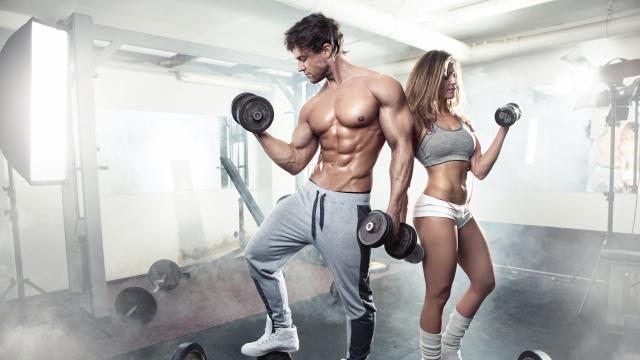Fitness Instagram, like every other place or population on earth, contains multitudes. There are athletes working their butts off, coaches promoting their business, models making a living. Not all of these people are legitimate fitness professionals, so if you look to Insta or YouTube for workout advice you need to ask yourself a few questions.
What is this person implying but not saying?
The number one lie of many fitness influencers is one they leave unsaid: It is the implication that whatever I am selling will get you the body you see here.
The truth is, people who make a living by being fit all got fit before they started selling workout programs or supplements. Once you have a jacked physique, you can endorse sawdust in a jar and people will connect the dots in their mind to assume that you’re selling them a muscle building supplement. If you have a lean body, you can sell a diet plan and people will assume that if they follow the plan they’ll get shredded like you.
To be totally honest for a minute: steroid use is fairly common among athletes who compete in sports that are not drug tested, or who don’t compete at all. But because it is illegal for recreational use in some places, many folks don’t want to talk about it. (There are exceptions, though: here’s a before-and-after post from sport scientist and bodybuilder Mike Israetel where he obliquely compares his “natural” years to the part of his training career that was “otherwise.”)
Don’t forget that influencers often use photo editing — with Photoshop, FaceTune, and other software — to make themselves look skinnier (or curvier) as needed. Posing to accentuate certain body parts is absolutely an art that can be taken to extraordinary lengths, as journalist Danae Mercer points out in several subversive little tutorials on her feed. Oh, and: if you’re looking at influencers selling booty workout plans, be aware that butt implants are very much a thing.
What is this person’s real area of expertise?
If somebody is selling diet plans, exercise programs, or coaching services, they should have credentials — formal or otherwise — to back them up. For example, a personal training certification from a legit organisation like ACE, ACSM, NSCA, or another accredited by NCAA is one thing to look for. Some coaches or instructors don’t have a formal credential, but can point to top athletes they’ve coached or fellow professionals who can vouch for them. These more subjective connections work best if you follow them to find the trainer or instructor in the first place: for example, if several of your favourite powerlifters are all coached by the same person, that person may be a good source of advice for you.
But remember that exercise and nutrition are not the same thing. If someone is giving advice on nutrition, check whether they are a registered dietitian or hold a similar qualification. In many places, “nutritionist” is not a legally defined term, but registered dieticians are professionals with a significant amount of training and experience.
Similar to the unspoken lie about body appearance, there is also another that goes something like: Science says I’m right. This one is trickier to detect, because evidence-based information is a great thing to look for, and there are plenty of professionals who openly discuss where their information comes from and how it shapes their recommendations. But there are also people who decide what they want to say, and then cherry-pick a few studies to make those messages look more legitimate.
Does the person have a consistent, somewhat boring message?
The truth about most things in fitness is, honestly, kind of dull. If you want to lose weight you need to find a way to eat fewer calories. If you want to build muscle, you’ll need to lift progressively heavier weights. If you want to get better at a sport, you have to work at it consistently for years.
The real experts — on Instagram or elsewhere — don’t make any secret of this. They’ll discuss the challenges of staying consistent, or offer tips on what exercises might help address a small problem you may find. They might share successes: before-and-after photos of themselves or their clients, or peak performances at competitions.
What they don’t do is suddenly declare a certain workout or type of exercise as the be-all-end-all. They also don’t present exercises or workouts as standalone solutions. If you choose a different cool-looking workout every day, you may have fun and move your body — which is one basic minimum goal met. But that’s not the same as having a program that will get you closer to your goals. Anyone can post a few exercises and call it a booty workout or the hidden secret to bicep gainz, but long term results come from the way you train over time.

Leave a Reply
You must be logged in to post a comment.